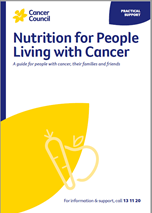- Home
- Pancreatic cancer
- Managing your diet and nutrition
Managing your diet and nutrition
Pancreatic cancer and its treatment can affect your ability to eat, digest and absorb essential nutrients. This section explains some common diet and nutrition problems, and how to manage them.
Learn more about:
- Overview
- Coping with the changes
- Seeing a dietitian
- Nutritional supplements
- Enzyme replacement therapy
- Tips for maintaining your weight
- Nausea and vomiting
- Diarrhoea
- Diabetes
- Video: Managing your diet and nutrition
Overview
During and after treatment, it’s important to make sure you are eating and drinking enough to maintain your weight and avoid malnutrition or dehydration. Different foods can affect people differently, so you will need to experiment to work out which foods cause problems for you. Most people will also have to take a special tablet to help with digestion.
See Nutrition and cancer for recipes and more tips.
Coping with the changes
Changes to the way you eat may make you feel anxious, particularly when you know eating well is important. Some people find it difficult to cope emotionally with the changes to how and what they can eat. Finding ways to enjoy your meals can help to improve your quality of life. It may help to talk about how you feel with your family and friends. You can also call Cancer Council 13 11 20 – our experienced health professionals may be able to arrange for you to speak with a Cancer Connect volunteer who has had a similar cancer experience.
Some people find that complementary therapies such as relaxation, meditation and acupuncture help them cope with diet and nutrition problems. Always tell your cancer care team if you are using or would like to try any complementary therapies.
Seeing a dietitian
If you have ongoing problems with food and eating, talk to a dietitian. Dietitians are experts in nutrition who can give you specialist advice on how to cope with nutrition-related problems and eating difficulties throughout different phases of the disease. A dietitian can prepare eating plans for you and give you advice about nutritional supplements.
Dietitians work in all public and most private hospitals. There may be a dietitian connected to your cancer treatment centre – check with your specialist or cancer care coordinator. Dietitians Australia can also help you find an accredited practising dietitian who works in your area and specialises in cancer. For details, call them on 1800 812 942 or visit Dietitians Australia.
If your GP refers you to a dietitian, you may be eligible for a Medicare rebate to help cover the cost. If you have private health insurance, you may be able to claim part of the cost.
Nutritional supplements
If you can’t eat a balanced diet or are losing too much weight, your doctor or dietitian may suggest nutritional supplements such as Sustagen, Ensure, Fortisip or Resource. These provide energy, protein and other nutrients that can help you maintain your strength.
A dietitian can recommend the right nutritional supplement for you and let you know where to buy it and how much to use. Nutritional supplements should be taken in addition to the foods you are able to eat, and are best used as snacks between meals.
Supplements are available as:
- ready-made drinks, bars, puddings and custards
- powders to mix with milk or water, to sprinkle on food.
→ READ MORE: Enzyme replacement supplements
Video: Managing your diet and nutrition
Meditation and Relaxation Podcast
Listen to more of our meditation and relaxation podcast for people affected by cancer
Prof Lorraine Chantrill, Honorary Clinical Professor, University of Wollongong, and Head of Department, Medical Oncology, Illawarra Shoalhaven Local Health District, NSW; Karen Baker, Consumer; Michelle Denham, 13 11 20 Consultant, Cancer Council WA; Prof Anthony J Gill, Surgical Pathologist, Royal North Shore Hospital and The University of Sydney, NSW; A/Prof Koroush Haghighi, Liver, Pancreas and Upper Gastrointestinal Surgeon, Prince of Wales and St Vincent’s Hospitals, NSW; Dr Meredith Johnston, Radiation Oncologist, Liverpool and Campbelltown Hospitals, NSW; Dr Brett Knowles, Hepato-Pancreato-Biliary and General Surgeon, Royal Melbourne Hospital, Peter MacCallum Cancer Centre, and St Vincent’s Hospital, VIC; Rachael Mackie, Upper GI – Clinical Nurse Consultant, Peter MacCallum Cancer Centre, VIC; Prof Jennifer Philip, Chair of Palliative Care, University of Melbourne, and Palliative Medicine Physician, St Vincent’s Hospital, Peter MacCallum Cancer Centre and Royal Melbourne Hospital, VIC; Lucy Pollerd, Social Worker, Peter MacCallum Cancer Centre, VIC; Rose Rocca, Senior Clinical Dietitian – Upper GI, Peter MacCallum Cancer Centre, VIC; Stefanie Simnadis, Clinical Dietitian, St John of God Subiaco Hospital, WA.
View the Cancer Council NSW editorial policy.
View all publications or call 13 11 20 for free printed copies.
